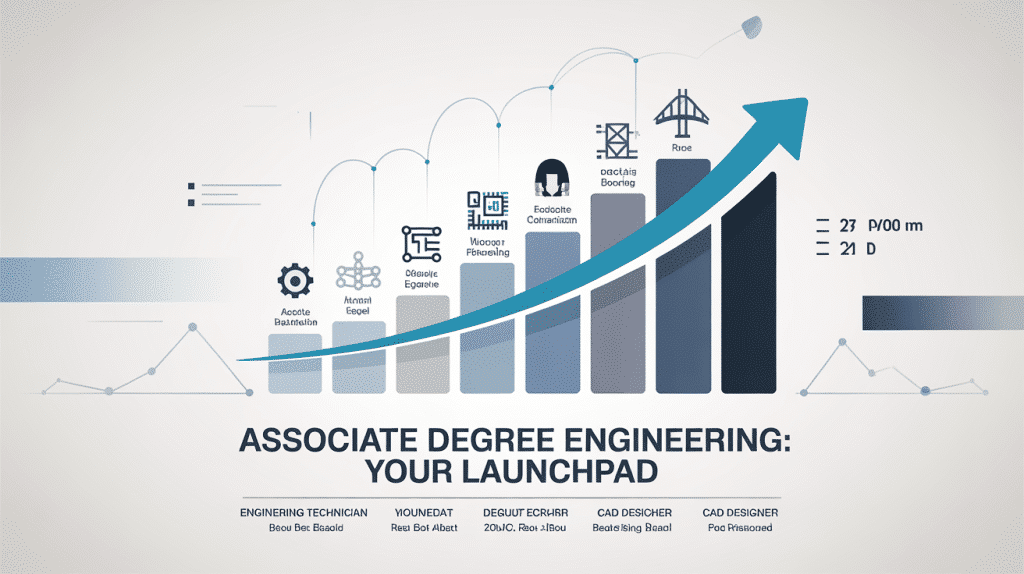Career Prospects After an Associate Degree in Engineering from Turkiye
Associate Degree Structure and Progression
Engineering education in Turkiye is organized into different tiers, with associate degrees representing a two-year educational commitment. These programs are designed to provide fundamental engineering knowledge while offering flexibility for further academic advancement.
A significant advantage of engineering associate degrees in Turkiye is the seamless progression opportunities they provide. Many associate degree programs are structured to allow graduates to continue directly to bachelor’s degree programs without time loss, creating a clear pathway for academic advancement. This is crucial for students who are ambitious and wish to maximize their educational experience and employability.
Employment Opportunities
Associate degree holders in engineering can access various entry-level positions across different sectors in Turkiye. The engineering job market is dynamic and shows promising growth, with several sectors actively recruiting engineering professionals.
Growth Sectors
- Technology Sector: The technology industry in Turkiye is experiencing remarkable expansion, projected to grow by 21.7% through 2024. This growth is set to generate approximately 1 million new jobs. By 2030, digital transformation and automation are expected to create an additional 3.1 million jobs across various sectors.
- Construction Market: The construction market in Turkiye presents substantial opportunities, projected to reach a value of TRY 1.48 trillion by 2025. This expansion indicates a consistent growth trend (CAGR of 2.5% through 2029), translating into increased demand for engineering professionals.
Regional Opportunities
Turkiye’s industrial regions offer particularly strong prospects for engineering graduates. Areas like Bursa, known for its advanced automotive industry, provide enhanced employment opportunities due to the concentration of engineering-focused businesses. Other industrial hubs include regions around key universities like Gebze Advanced Technology University and Sakarya University.
Continuing Education Pathways
Associate degree holders have well-defined options for further education, allowing them to expand their qualifications and improve their career prospects:
- Bachelor’s Degree Completion: Most associate degree programs in engineering enable graduates to transition directly to bachelor’s degree programs, completing their four-year engineering qualification.
- Master’s Degree Options: After completing a bachelor’s degree, graduates can pursue either thesis or non-thesis master’s programs, catering to both academic aspirations and industry-oriented career paths.
Pathways to Advanced Engineering Degrees
Among the universities in Turkiye, institutions like Ozyegin University and Beykent University offer specialized curricula that ease the transition from associate to bachelor’s and further to master’s degrees in engineering disciplines.
International Recognition
Engineering programs in Turkiye that hold MÜDEK accreditation offer graduates additional international recognition through EUR ACE and WASHINGTON ACCORD certificates. These credentials validate the quality of Turkish engineering education globally and enhance employment prospects for graduates seeking international careers.
In-Demand Engineering Fields
Several engineering specializations demonstrate particularly strong career prospects in Turkiye:
- Information Systems Engineering: Graduates develop essential skills in system analysis and design, qualifying them for positions in network management and cybersecurity.
- Aerospace Engineering: With Turkiye’s growing aviation sector, this field offers specialized opportunities for technically skilled graduates.
- Civil Engineering: Supporting the booming construction sector, civil engineering remains a consistently in-demand field, with graduates often starting in technical support roles.
Emphasizing Demand
Positions in these fields can serve as the foundation for a promising career. As graduates acquire experience or pursue additional qualifications, they can advance to more specialized positions or leadership roles.
Career Advancement Paths
Engineering associate degree graduates typically follow one of these career trajectories:
- Direct Industry Entry: Starting in technical support or assistant engineering roles, gaining practical experience.
- Academic Progression: Continuing to bachelor’s and potentially master’s degrees to qualify for more advanced engineering positions.
- Academic and Research Roles: Some graduates who complete further education may pursue opportunities as research assistants or university lecturers.
As Turkiye continues to develop its industrial and technological infrastructure, the demand for engineering professionals at all levels is expected to remain strong, creating sustainable career paths for associate degree graduates in engineering fields.
Take the Next Step with Study in Turkiye
Are you ready to help your students navigate their educational journey in Turkiye? Explore the endless possibilities and take the next step towards a bright future.

